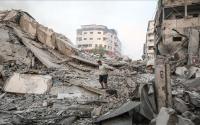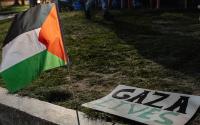1 February 2007Ali Saysel
Hrant Dink, the prominent Armenian intellectual of Turkey, co-founder and the editor-in-chief of the Armenian weekly Agos was shot dead on 19th January at around 3 pm on one of the busiest streets of Istanbul, just in front of the apartment block home to Agos's small office. Hrant Dink was known as a vocal and true defender of people's fraternity, equity and freedom of expression. He was courageous enough to express in Turkey that "1915 was genocide", even though he knew very well about the many articles in Turkish Penal Code that can immediately criminalize anyone making such a claim publicly. And he had held a true standard of freedom of expression that urged him to express in France that "1915 was not genocide", ridiculing French Parliament's ruling against such contrary claims.
Hrant Dink was born in 1954 in Malatya, one of the many eastern towns of Turkey, all once home to a lively Armenian community before 1915. At the age of seven, with his family, he migrated to Istanbul and had his primary education in Armenian orphanages and minority schools. He studied zoology and philosophy in Istanbul University. He had somehow been active in the leftist movement in the 70's, managed a large Armenian summer school in the 80's, had his first journalism experience in Patriarchate's office and in 1996 co-found the weekly Agos with the purpose of building a bridge between the Armenian and Turkish communities, to be the voice of the Armenian community and to fight against all sorts of injustices against those who are underprivileged and in particular the Armenians. But Hrant Dink's impact and reach had been beyond Agos, with his speeches and columns published in other dissident and sometimes in main-stream media and press, and through his participation in many forums and democratic platforms.
There have been many responses to his assassination. For the Armenian community, perhaps it was a trauma recalling the sufferings that are well written on their national folklore and common memory. Were their elders right when they warned the young Armenians that Turks are not dependable? Were Hrant and his friends over-optimistic in thinking that Turks can actually change? His friends, the rather thin democratic groups, leftists and some liberals had an emotional turmoil knowing that Hrant was not the first and probably would not be the last. After all, since the Turkish state was established in 1923, 69 prominent journalists were killed, excluding the "less valuable" ones, like the over 26 mostly Kurdish media workers that disappeared between 1992-1995. For the state and its cogs in the elite-press, this murder was awful, inhuman and would obviously harm Turkey's foreign interests. The perpetrators had to be brought before justice, now it was time to question the nationalist and jingoist atmosphere in the country, yet without any specific reference to their own contribution in the creation of this nationalist atmosphere. Finally, the extreme nationalists and national-islamists adopted a rather pragmatic, hence hypocritical stand saying that the murder was detrimental for the national interests and therefore that could be a conspiracy of foreign intelligence units like MOSSAD and CIA and their local collaborators, or rather Armenian diaspora trying to break down the national unity and the national identity of the country.
Who then killed Hrant Dink? It had been easy to catch the hoodlum, a seventeen years old male, an easy recruit probably acting for his bigger brother's group which was possibly subcontracted by some more experienced group that involves real professionals with considerable counterinsurgency experience in official service. Following the fate of previous investigations for other assassins of prominent intellectuals and activists, there is not much hope that this inquiry will go deep enough to discover the real criminal elements. For instance, Hrant Dink's lawyer says that he was receiving death treats from a retired General, Veli Küçük who has been allegedly organizing and commanding Special Forces in Gendarmerie before his retirement. General Küçük stays active after his retirement conducting a group of lawyers bringing lawsuits against the prominent intellectuals and thus victimizing them by organized insulting demonstrations in front of the courts while the sessions are being held. Almost ten days after the assassination, none of these people are questioned by the authorities yet.
There are many assassinations in the recent history of Turkey that are very well known by the public and have become a common memory of the Turkish and Kurdish dissidents. When the voice of the opposition needs to be suppressed, a prominent intellectual or human rights activist is murdered, followed by others, until a terror atmosphere is created where no one dares to speak out, so that some sections of the state apparatus can implement their sinister hidden agenda.
It can be argued that, Dink had been the victim of Turkish militarism. The military and the political parties deliberately sought to create a jingoist-militarist cultural atmosphere; the mass-media, mass-culture industry intentionally endorsed and exploited this ascending culture and helped to create a "lynch culture" of so-called self motivated hooligans. And under this atmosphere, the articles in the new Turkish Penal Code of year 2005 and the new Anti-Terror Law of year 2006 deliberately victimized the human rights activists and intellectuals and labeled them betrayers.
What is then at stake at the moment? During US's restructuring of the Middle East, Turkey found its conventional Kurdish denial policy obsolete. Seeing that it is impossible to avoid an emerging Kurdish political structure in old Iraqi soils, the military establishment panicked by projections that the country can be divided if the millions of Kurds in Turkey pursue common ends with their Iraqi fellows. The developments in Iraqi Kurdistan and the inability of the Turkish military to manipulate the situation in Iraq and to suppress the political demands of Kurds at home raised the atmosphere against Kurds. Human rights violations in Kurdish regions increased and approached its 1990s levels at the time when there was a low-intensity warfare. In the 2005 Newroz celebrations, after a child burned a Turkish flag, the Chief Army Officer addressed many Kurds as not proper citizens but "so-called" citizens. In Autumn 2005, in the border Kurdish town of Semdinli in southeast Turkey, when the perpetrators of the bombing of a bookstore were unveiled by the local people they were found out to be army officials. Soon, the judicial process also accusing the Chief Army Officer for organized conspiracy was halted by the dismissal of the public prosecutor, to the disappointment of many Kurds. In April 2006, during the funeral of a Kurdish armed militant in his hometown, the largest Kurdish town of Diyarbakir, people revolted against police and the succeeding events were suppressed in days by force, killing tens of children and adults on the street.
The political parties, without exception, laid their faith on this ascending jingoist-militarist atmosphere. The red-white colors of Turkish nationalism and the crescent-star on Turkish flag became ordinary objects of propaganda. A conference on "Ottoman Armenians" in Spring 2005, by three relatively liberal universities in Istanbul had to be indefinitely postponed because of the rivaling nationalist attitudes of both the governing and opposition parties in the Parliament in Ankara. Again, the participants of the conference were labeled as betrayers before the public.
A TV series, covering illegal acts and crimes of a Turkish mafioso character against so-called national enemies, his talents on how one can evade being punished by law had become a cult for teenage males in the country. Fictions and movies on Turkish forces fighting against Americans and romantic and legendry versions of Turkish Liberation War became best sellers in published media. Hitler's Mein Kampf sold thousands of copies, by far exceeding the circulation of any decent book on the shelves in recent years.
Furthermore, thin activist groups and intellectuals were threatened by law. The year 2005 Turkish Penal Code, TPC 301 "insulting Turkishness", TPC 216 "inflicting hatred", the special law 5816 "insulting Kemal Ataturk - the founder of the modern republic", and Anti-Terror Law article 6 "adopting the propaganda of terror organization", and many other articles were designed to suppress the truths about suffering underprivileged groups, harass the intellectuals and label them as betrayers and disrupters before an extremely nationalistic public. Even their trials were a drama. Jingoist groups were gathering around the court, insulting and assaulting, and all this was being watched by the police officials.
Hrant Dink was one of those defendants. He was tried and convicted by TPC 301. Against all expert opinion before the court, claiming that Hrant did not insult Turkishness, he was convicted to 6 months imprisonment by the Supreme Court in Ankara. He was sure of himself that he did not insult but the verdict was a big disappointment. It was very difficult for him to be understood and perceived as someone insulting his Turkish fellows, he would not insult anyone, and under such circumstances it could even become impossible for him to live with Turks, with a group of people he had supposedly insulted. Other fellow defendants of similar trials, like the Nobel Laureate Orhan Pamuk, Elif Safak and some others were acquitted. Hrant was not, although he was quite as salient as Pamuk and Safak for the world public opinion and international community.
He was not acquitted, because he was Armenian. He did something wrong, something that cannot be tolerated: for the first time since 1915, an Armenian in Turkey stood up and openly claimed that "1915 is genocide" and at the same time said "I am an Armenian and this is my country". And he said all this without inflicting any hatred on Turkish and Kurdish people. He sought equitable means to live together. That was too much, that was something to be punished.
Eventually, on 19th January, he was assassinated by a seventeen year old hoodlum. His funeral on 23rd January was quite unanticipated in many respects. For the first time in Istanbul, over 100.000 people marched and mourned during a funeral. For the first time in Turkey, over 100.000 people chanted "We are all Armenians". This obviously shows an emerging democratic culture against ascending racism and jingoism in the country. Moreover, for the first time in the country, the citizens had the chance to see the true human face of a dissident and the mourning of his friends and relatives on live broadcast through elite media channels. It proved that, when people are given the chance to see the truth, they have the ability to understand and build empathy with the victims. That is, if they can generalize this feeling onto hundreds of other victims in this country whose names are unknown to many, a decent public opinion can emerge and can help building a more democratic society.
Hrant Dink's life, and unfortunately his funeral taught something. On the other hand malicious forces are still much larger, much stronger and much more vocal. The future in Turkey will be one of struggle between thriving democratic opinion and Turkish militarism, covering itself as lay people's nationalism, racism and jingoism.
Ali Saysel is a scholar in Bogazici University, Istanbul and he can be reached at [email protected]
http://www.zmag.org/content/showarticle.cfm?SectionID=74&ItemID=12009






